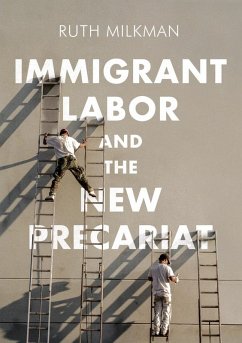
Precarious Lives (eBook, ePUB)
Job Insecurity and Well-Being in Rich Democracies
Versandkostenfrei!
Sofort per Download lieferbar
18,99 €
inkl. MwSt.
Weitere Ausgaben:

PAYBACK Punkte
0 °P sammeln!
Employment relations in advanced, post-industrial democracies have become increasingly insecure and uncertain as the risks associated with work are being shifted from employers and governments to workers. Arne L. Kalleberg examines the impact of the liberalization of labor markets and welfare systems on the growth of precarious work and job insecurity for indicators of well-being such as economic insecurity, the transition to adulthood, family formation, and happiness, in six advanced capitalist democracies: the United States, the United Kingdom, Germany, Japan, Spain, and Denmark. This insigh...
Employment relations in advanced, post-industrial democracies have become increasingly insecure and uncertain as the risks associated with work are being shifted from employers and governments to workers. Arne L. Kalleberg examines the impact of the liberalization of labor markets and welfare systems on the growth of precarious work and job insecurity for indicators of well-being such as economic insecurity, the transition to adulthood, family formation, and happiness, in six advanced capitalist democracies: the United States, the United Kingdom, Germany, Japan, Spain, and Denmark. This insightful cross-national analysis demonstrates how active labor market policies and generous social welfare systems can help to protect workers and give employers latitude as they seek to adapt to the rise of national and global competition and the rapidity of sweeping technological changes. Such policies thereby form elements of a new social contract that offers the potential for addressing many of the major challenges resulting from the rise of precarious work.
Dieser Download kann aus rechtlichen Gründen nur mit Rechnungsadresse in D ausgeliefert werden.













